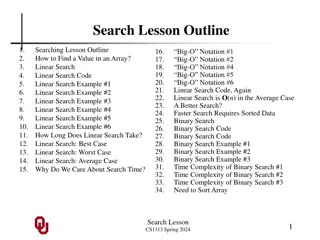
Sorted Lists and Searching Techniques
Explore the concepts of linear search and binary search on sorted lists, including their implementation and comparison. Learn how to efficiently search for specific values in ordered lists, maximizing the advantage of the list's sorted nature. Understand the time complexities associated with different search algorithms.
Uploaded on | 2 Views
Download Presentation

Please find below an Image/Link to download the presentation.
The content on the website is provided AS IS for your information and personal use only. It may not be sold, licensed, or shared on other websites without obtaining consent from the author. If you encounter any issues during the download, it is possible that the publisher has removed the file from their server.
You are allowed to download the files provided on this website for personal or commercial use, subject to the condition that they are used lawfully. All files are the property of their respective owners.
The content on the website is provided AS IS for your information and personal use only. It may not be sold, licensed, or shared on other websites without obtaining consent from the author.
E N D
Presentation Transcript
1 CSCI 104 Searching and Sorted Lists Mark Redekopp David Kempe
2 SEARCH
3 Linear Search Search a list (array) for a specific value, k, and return the location Sequential Search Start at first item, check if it is equal to k, repeat for second, third, fourth item, etc. O( ___ ) O(n) int search(vector<int> mylist, int k) { int i; for(i=0; i < mylist.size(); i++){ if(mylist[i] == k) return i; } return -1; } myList index 2 0 3 1 4 2 6 3 9 10 13 15 19 4 5 6 7 8
4 Binary Search Sequential search does not take advantage of the ordered (a.k.a. sorted) nature of the list Would work the same (equally well) on an ordered or unordered list Binary Search Take advantage of ordered list by comparing k with middle element and based on the result, rule out all numbers greater or smaller, repeat with middle element of remaining list, etc. k = 6 List index 2 0 3 1 4 2 6 3 9 10 13 15 19 4 5 6 7 8 Start in middle 6 < 9 List index 2 0 3 1 4 2 6 3 9 10 13 15 19 4 5 6 7 8 6 > 4 List index 2 0 3 1 4 2 6 3 9 10 13 15 19 4 5 6 7 8 6 = 6
5 Binary Search Search an ordered list (array) for a specific value, k, and return the location Binary Search Compare k with middle element of list and if not equal, rule out of the list and repeat on the other half "Range" Implementations in most languages are [start, end) Start is inclusive, end is non- inclusive (i.e. end will always point to 1 beyond true ending index to make arithmetic work out correctly) int bsearch(vector<int> mylist, int k, int start, int end) { // range is empty when start == end while(start < end){ int mid = (start + end)/2; if(k == mylist[mid]) return mid; else if(k < mylist[mid]) end = mid; else start = mid+1; } return -1; } myList index 2 0 3 1 4 2 6 3 9 10 13 15 19 4 5 6 7 8
6 Binary Search k = 11 int bsearch(vector<int> mylist, int k, int start, int end) { // range is empty when start == end while(start < end){ int mid = (start + end)/2; if(k == mylist[mid]) return mid; else if(k < mylist[mid]) end = mid; else start = mid+1; } return -1; } List index 2 0 3 1 4 2 6 3 9 11 13 15 19 4 5 6 7 8 start mid end List index 2 0 3 1 4 2 6 3 9 11 13 15 19 4 5 6 7 8 start mid end List index 2 0 3 1 4 2 6 3 9 11 13 15 19 4 5 6 7 8 startmid end List index 2 0 3 1 4 2 6 3 9 11 4 13 15 19 7 5 6 8 start end mid
7 Prove Time Complexity T(n) =
8 Search Comparison Linear search = O(______) Precondition: None Works on (ArrayList / LinkedList) Binary Search = O(_____) Precondition: List is sorted Works on (ArrayList / LinkedList) int search(vector<int> mylist,int k) { int i; for(i=0; i < mylist.size(); i++){ if(mylist[i] == k) return i; } return -1; } int bsearch(vector<int> mylist, int k, int start, int end) { int i; // range is empty when start == end while(start < end){ int mid = (start + end)/2; if(k == mylist[mid]) return mid; else if(k < mylist[mid]) end = mid; else { start = mid+1; } } return -1; }
9 Search Comparison Linear search = O(n) Precondition: None Works on ArrayList or LinkedList Binary Search = O(log(n)) Precondition: List is sorted Works on ArrrayList only int search(vector<int> mylist,int k) { int i; for(i=0; i < mylist.size(); i++){ if(mylist[i] == k) return i; } return -1; } int bsearch(vector<int> mylist, int k, int start, int end) { int i; // range is empty when start == end while(start < end){ int mid = (start + end)/2; if(k == mylist[mid]) return mid; else if(k < mylist[mid]) end = mid; else { start = mid+1; } } return -1; }
10 Introduction to Interpolation Search Given a dictionary, if I say look for the word 'banana' would you really do a binary search and start in the middle of the dictionary? Assume a uniform distribution of 100 random numbers between [0 and 999] [679 372 554 ] Now sort them [002 009 015 ] At what index would you start looking for key=130 myList 002 009 015 024 039 981 index 00 01 02 03 04 99
11 Linear Interpolation If I have a range of 100 numbers where the first is 400 and the last is 900, at what index would I expect 532 (my target) to be? target 900 endVal - startVal ? 532 ? 400 desiredIdx endIdx-startIdx 99 idx 0 1 2 (EndIdx StartIdx+1) (EndVal StartVal) desiredIdx-startIdx target-startVal = (EndIdx StartIdx+1) (EndVal StartVal) (target-startVal) * + startIdx = desiredIdx (532-400)*(100/500) + 0 = desiredIdx 132*0.2 = desiredIdx 26.4 = desiredIdx floor(26.4) = 26 = desiredIdx
12 Interpolation Search Similar to binary search but rather than taking the middle value we compute the interpolated index int bin_search(vector<int> mylist, int k, int start, int end) { // range is empty when start == end while(start < end){ int mid = (start + end)/2; if(k == mylist[mid]) return mid; else if(k < mylist[mid]) end = mid; else start = mid+1; } return -1; } int interp_search(vector<int> mylist, int k, int start, int end) { // range is empty when start > end while(start <= end){ int loc = interp(mylist, start, end, k); if(k == mylist[loc]) return loc; else if(k < mylist[loc]) end = loc; else start = loc+1; } return -1; }
13 Another Example Suppose we have 1000 doubles in the range 0-1 Find if 0.7 exists in the list and where Use interpolation search First look at location: 0.7 * 1000 = 700 But when you pick up List[700] you find 0.68 We know 0.7 would have to be between location 700 and 100 so we narrow our search to those 300 Interpolate again for where 0.7 would be in a list of 300 items that start with 0.68 and max value of 1 (0.7-0.68)/(1-0.68) = 0.0675 Interpolated index = floor( 700 + 300*0.0675 ) = 720 You find List[720] = 0.71 so you narrow your search to 700-720 Interpolate again (0.7-0.68)/(0.71-0.68) = 0.6667 Interpolated index = floor( 700 + 20*0.6667 ) = 713 Example from "Y. Perl, A. Itai., and H. Avni, Interpolation Search A Log Log N Search, Communications of the ACM, Vol. 21, No. 7, July 1978"
14 Interpolation Search Summary Requires a sorted list An array list not a linked list (in most cases) Binary search = O(log(n)) Interpolation search = O(log(log(n)) If n = 1000, O(log(n)) = 10, If n = 256,000, O(log(n)) = 18, Makes an assumption that data is uniformly (linearly) distributed If data is "poorly" distributed (e.g. exponentially, etc.), interpolation search will break down to O(log(n)) or even O(n) Notice interpolation search uses actual values (target, startVal, endVal) to determine search index Binary search only uses indices (i.e. is data agnostic) Assumes some 'distance' metric exists for the data type If we store Webpage what's the distance between two webpages? O(log(log(n)) = 3.332 O(log(log(n)) = 4.097
15 SORTED LISTS
16 Overview If we need to support fast searching we need sorted data Two Options: Sort the unordered list (and keep sorting when we modify it) Keep the list ordered as we modify it Now when we insert a value into the list, we'll insert it into the required location to keep the data sorted. See example 0 push(7) 7 7 7 7 0 1 7 7 push(3) 3 7 0 1 2 7 push(8) 3 7 8 0 1 2 3 push(6) 3 6 7 8
17 Sorted Input Class insert() puts the value into its correct ordered location Backed by array: O( ) Backed by LinkedList: O( ) find() returns the index of the given value Backed by array: O( ) Backed by LinkedList: O( ) class SortedIntList { public: bool empty() const; int size() const; void insert(const int& new_val); void remove(int loc); // can use binary or interp. search int find(int val); int& get(int i); int const & get(int i) const; private: ??? };
18 Sorted Input Class Assume an array based approach, implement insert() class SortedIntList { public: private: int* data; int size; int cap; }; void SortedIntList::insert(const int& new_val) { }
19 XKCD #724 Courtesy of Randall Munroe @ http://xkcd.com






















